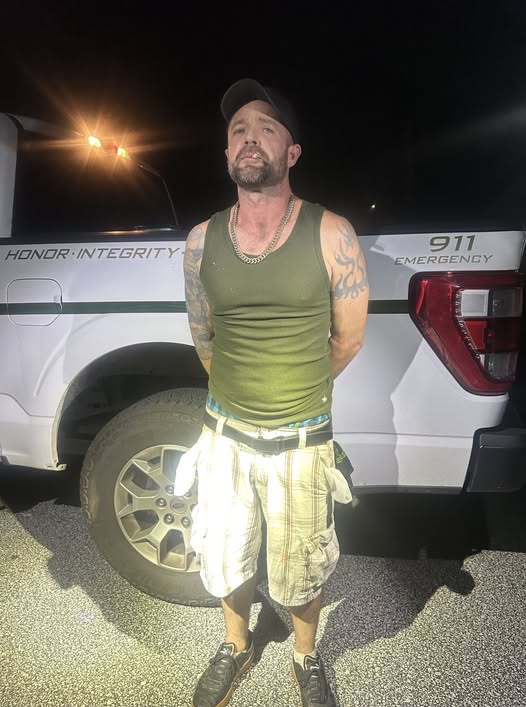In a case that has captured the attention of consumers, law enforcement, and regulatory bodies across Florida, Andrew Ingram, the man behind Busy Bee Roofing, was taken into custody by the Volusia Sheriff’s Office on Saturday night following multiple allegations that he had defrauded local homeowners out of tens of thousands of dollars. The arrest marks a turning point in a months-long investigation and raises broader questions about contractor fraud, regulatory enforcement, and consumer vulnerability in Florida’s booming but precarious home improvement industry.
Andrew Ingram’s name first surfaced in official circles when a Port Orange homeowner filed a formal complaint claiming that a substantial $21,000 deposit paid to Busy Bee Roofing in November of the previous year had yielded neither the promised roofing work nor any official steps toward permitting or scheduling. Ingram allegedly accepted the deposit under the pretense of commencing a full roof replacement, but as weeks turned into months with no activity, the homeowner realized something was amiss.
The gravity of the situation deepened when a second complaint emerged out of Edgewater, another town in Volusia County. This second victim reported paying Ingram a $9,000 advance for roofing services that never materialized. In both cases, Ingram is accused of ceasing all communication after receiving payment—a hallmark behavior in cases involving fraudulent contractors. As the stories mirrored one another with alarming symmetry, investigators from the Volusia County Financial Crimes Unit began piecing together a pattern of deceit.
What sets this case apart is not only the sizable amount of money lost by the victims—$30,000 in total—but also the apparent brazenness with which Ingram allegedly operated. Ingram is not licensed as a contractor in the state of Florida, an important legal distinction that transforms what might be viewed as civil negligence into potential criminal fraud. Florida law requires anyone performing roofing work exceeding $500 in value to hold a valid contractor’s license issued by the Florida Department of Business and Professional Regulation (DBPR). Violating that mandate can lead to felony charges, especially when done repeatedly or with intent to defraud.
The arrest was announced late Saturday, with the Volusia Sheriff’s Office issuing a public statement confirming that Andrew Ingram had been taken into custody on outstanding warrants related to both the Port Orange and Edgewater complaints. The Office further encouraged any additional victims to come forward by contacting the Financial Crimes Unit directly at (386) 254-1537. Law enforcement officials suspect that Ingram’s activities may extend beyond the two confirmed cases, and that more residents of the Central Florida area could have fallen prey to his alleged schemes.
The legal charges currently filed against Ingram include two counts of grand theft—one in the first degree, related to the $21,000 Port Orange case, and one in the second degree for the $9,000 Edgewater case—as well as a count of operating as an unlicensed contractor. Florida statutes define grand theft in the first degree as involving the unlawful taking of property valued at $20,000 or more, which can result in a prison sentence of up to 30 years if convicted. Operating without a contractor’s license is a separate criminal offense under Florida law and can carry both civil and criminal penalties, including fines and jail time.
As investigators now comb through Ingram’s business records, bank transactions, and communication history, they are also examining the scope of Busy Bee Roofing’s operations. What is not yet clear is how many contracts Ingram may have entered into without delivering services, or whether any completed work was ever performed to code. These details are expected to emerge in the coming weeks as the case progresses through the legal system.
Busy Bee Roofing, as it turns out, was not registered with the DBPR, nor was it listed with the Better Business Bureau (BBB) or any known professional roofer’s association in Florida. This lack of affiliation is often a red flag for consumers, but in today’s fast-paced world of digital marketing and on-demand services, many homeowners rely on social media ads, Craigslist listings, or word-of-mouth when hiring contractors, sometimes bypassing formal verification.
The rising cost of home repairs in Florida—exacerbated by hurricane damage, insurance issues, and a red-hot housing market—has made residents particularly vulnerable to contractor fraud. Roofing, being both essential and expensive, is one of the most common industries where fraud proliferates. Florida ranks among the top states in the nation for contractor-related scams, with the Attorney General’s Office receiving thousands of complaints each year. Unlicensed activity is not only a regulatory issue; it can endanger the safety of homes and the lives of those who inhabit them. Improper or nonexistent repairs can lead to catastrophic failures during extreme weather, mold infestations, or even structural collapse.
As such, the case of Andrew Ingram has ignited a wider conversation about how state and local governments can better safeguard consumers. One immediate concern is the enforcement gap between licensing authorities and law enforcement. While the DBPR is responsible for issuing and regulating licenses, it does not have criminal prosecutorial authority. That responsibility falls to state attorneys and sheriffs’ offices, who must act based on reports submitted by the public. This often results in a lag between fraudulent activity and enforcement action, especially when victims are unaware of their rights or unsure where to turn for help.
The victims in this case, whose identities have not been disclosed to protect their privacy, represent a growing segment of homeowners caught in a trap of trust. One source close to the Port Orange family described their experience as “emotionally devastating,” noting that the money they paid to Ingram had been saved over years specifically for the roof renovation project. “We were doing the responsible thing,” the source said. “We checked the business online, talked to Andrew directly, and he seemed trustworthy. He gave us a receipt, a quote, everything looked legitimate. Then he disappeared.”
This sense of betrayal is compounded by the stress of pursuing justice. For many victims, navigating the process of filing a police report, submitting evidence, and cooperating with ongoing investigations can be daunting. Financial restitution is often uncertain, especially when the perpetrator lacks sufficient assets or has spent the ill-gotten funds. Civil lawsuits may offer a path to compensation, but they involve legal costs that not all victims can afford to bear.
Ingram’s arrest has also renewed interest in public education efforts around contractor verification. Authorities emphasize the importance of verifying licenses through the DBPR’s online portal, reviewing contractor reviews through reputable platforms, and insisting on detailed contracts before any money changes hands. In addition, they advise using credit cards or traceable forms of payment to provide recourse in the event of fraud.
Still, the arrest does not erase the damage already done. In the two known cases, roofs remain unrepaired, and the victims are left scrambling to find new contractors—this time at an even greater cost, as material prices and labor rates have surged dramatically in recent years. Roofing jobs that once cost $15,000 now often exceed $25,000 or more, depending on square footage, pitch, and material selection.
Many in the legal and advocacy community see this case as a test for the system’s ability to hold fraudulent contractors accountable. “We need to see not only prosecution but restitution,” said one consumer rights attorney based in Daytona Beach. “People like Andrew Ingram thrive because the penalties for white-collar fraud often pale in comparison to the pain they cause. This has to change.”
Meanwhile, Ingram remains in custody awaiting arraignment. The investigation remains ongoing, and the Volusia Sheriff’s Office has reiterated its appeal for additional victims or witnesses to come forward. Whether this case leads to systemic reform or remains an isolated cautionary tale may well depend on what happens next—in courtrooms, in regulatory offices, and in the homes of every Florida resident who seeks to make their property safer, more livable, and more valuable.




